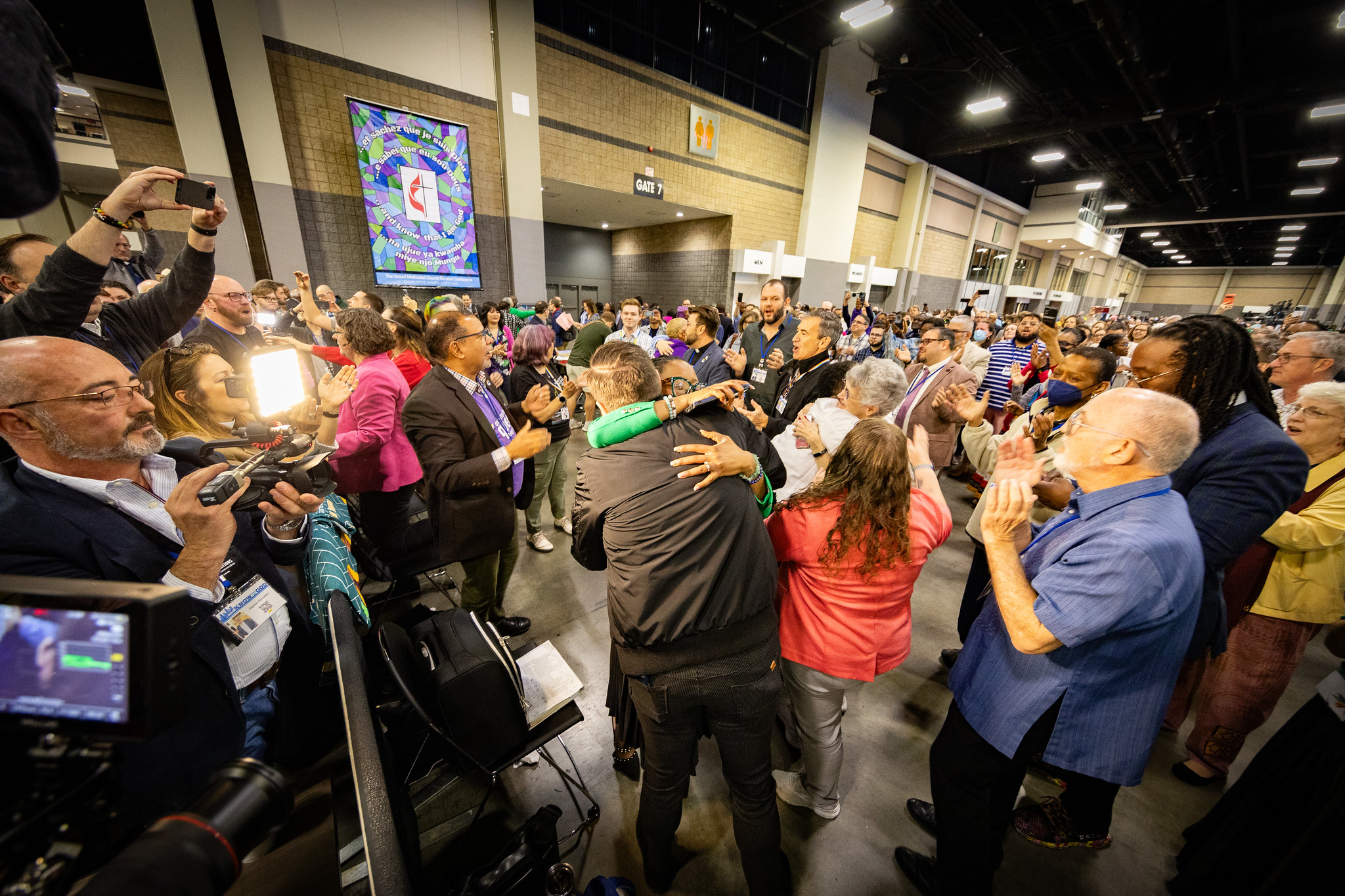In a historic vote on Wednesday, May 1, General Conference delegates voted to eliminate the 40-year ban on the ordination of “self-avowed practicing” gay clergy.
JAMES DEATON
Content Editor
Tears flowed from the eyes of Michigan United Methodists during Wednesday’s meetings at General Conference as a 40-year ban on the ordination of “self-avowed practicing” gay clergy ended. Without debate, delegates approved the change alongside 22 pieces of legislation on the consent calendar.
Also on the consent calendar, delegates voted that superintendents are not to penalize clergy or churches for holding— or refraining from holding — same-sex weddings. In order to expedite the legislative process in the plenary sessions, legislative committee items are grouped together, placed on a consent calendar, and voted on in blocks.
The legislation approved on this morning’s consent calendar continues the trend of this General Conference, which is quietly reversing some of The United Methodist Church’s longtime restrictions against LGBTQ members. More pieces of legislation related to the removal of harmful language against LGBTQ persons will come later in the week.
This is a deeply personal matter for many people in The United Methodist Church, as LGBTQ friends, family, and loved ones who feel called to ordained ministry have been excluded because of their identity and who they love. These restrictions have been extremely painful.
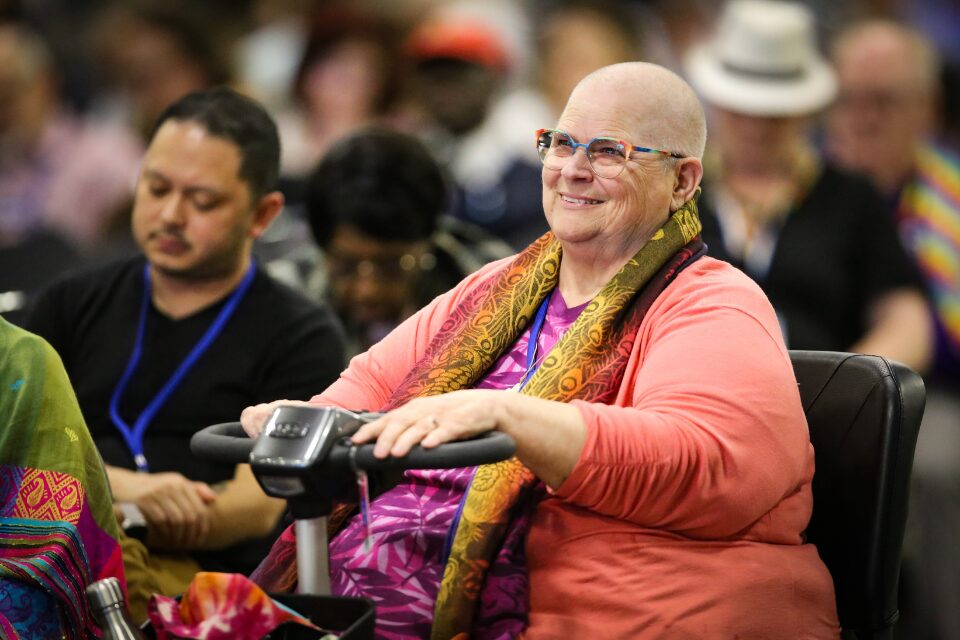
Tears of joy came for Rev. Dia Vale, a retired elder from the Michigan Conference attending General Conference as an observer. She recalls the long string of votes at previous General Conferences where harmful and restrictive language was added to church law, causing her tears of pain and grief. But today was different.
“After all of the votes that made us cry over the previous quadrennia,” she said, “to be able to cry tears of joy was an incredibly different thing. And what really got me is that it was quiet, that nobody had to fight about it.”
Dia says that she came to General Conference to spread love. “That’s what I do,” she explains. “Today, I’ve gone around hugging as many people as I could find. I saw a woman downstairs who was sitting there trembling. I offered a hug, and she just sobbed on my shoulder and said, ‘My son will not darken the door of a church.’ I said, ‘Well, maybe someday he’ll be able to.”
During the mid-morning break, delegates and observers formed a circle of 200 to 300 people, clapping and singing such hymns as “Child of God” and “Draw the Circle Wide.” Many hugged, and more than a few cried, in a mass release of joy for those who had pushed, some for decades, to make The United Methodist Church fully inclusive.
The scene was a marked contrast to that of the special General Conference in St. Louis in 2019, which left progressives and many centrists in the denomination distraught at the tightening of restrictions against LGBTQ participation.
Rev. Paul Perez, clergy co-chair of the Michigan Conference delegation, expressed his joy in this historic moment: “Many of my loved ones, friends, and colleagues have been harmed by these policies and procedures over the years. So many gifted leaders, for their own care and well-being, have left our church because of these harmful words. God’s gracious, spacious, and loving Spirit moved today!”
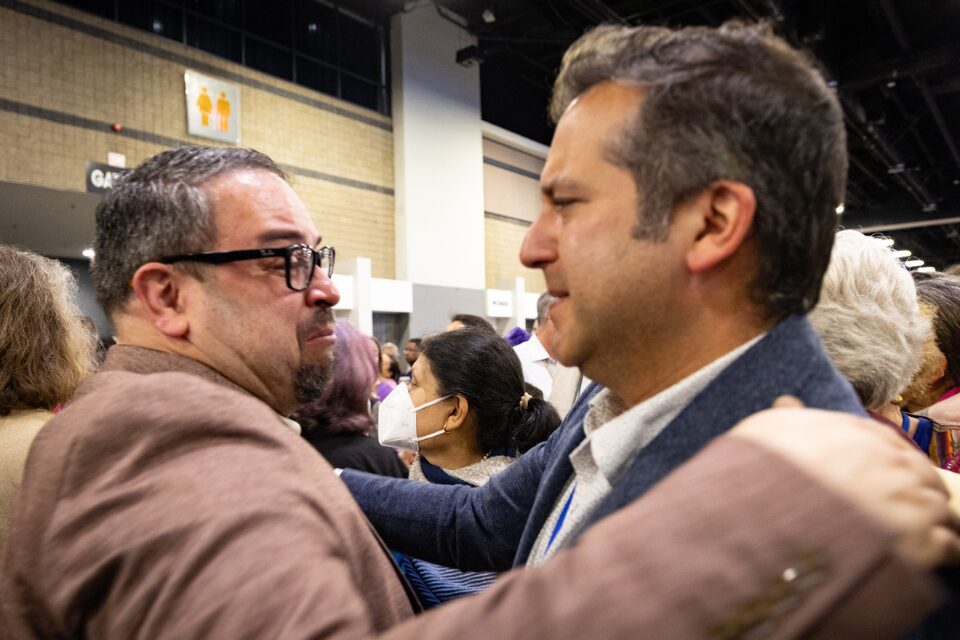
Laura Witkowski, lay co-chair, also celebrated this moment: “It’s a new and hopeful day in The United Methodist Church. So many of those who came before me have worked on removing the harmful language for a long time. I can’t express how privileged I feel to have had a small part in this day. The Michigan Conference can continue to be who we have named ourselves to be and welcome all into our faith communities in truly open and loving ways.”
The piece of legislation related to not penalizing clergy or churches for holding— or refraining from holding — same-gender weddings has also been painful, as it has put clergy in an ethical bind. Previously, if a United Methodist clergy, out of conscience, chose to marry a same-sex couple, the clergy could be punished under church law.
As an observer, Rev. Ed Rowe, pastor emeritus of Detroit: Central UMC, is attending General Conference. In 2014, Ed was brought up on charges for performing a same-sex wedding, but he did not go to trial. Michigan Area Bishop Deborah Kiesey worked with Ed on a just resolution based on the “Truth and Reconciliation Commission” model used in South Africa following the end of apartheid. This is a sign that the Michigan Conference has been moving toward inclusion for some time.
It should be noted that nothing passed by General Conference or under consideration would compel churches to receive a gay pastor. The legislation approved this morning also explicitly protects the right of clergy and churches not to officiate at or host same-sex weddings.
Today’s decisions reaffirm the spirit and tone of the 2024 General Conference and the creative reimagining of what the church might look like in different contexts, thanks to the passing of regionalization legislation and its possible ratification.
For the past 40 years or so, says clergy reserve delegate Rev. Joel Fitzgerald, “the church was trying to dictate ministry in every nook and cranny in our church. And we knew that wasn’t working, and we experienced it not working at [the contentious special 2019 General Conference], which was the final straw when everyone realized this isn’t going to work.”
Joel believes the passing of these pieces of legislation confirms what the church has already been doing, living into this new era of allowing ministry for people who want to pursue it but not forcing it on those who don’t. “In some ways, it’s getting back to our Wesleyan roots of being intensely practical people who try to do their best to spread the good news in our context. That’s going to look different for me in Michigan than it does for others around the world. And so it’s very nice to see this harmful language gone.”
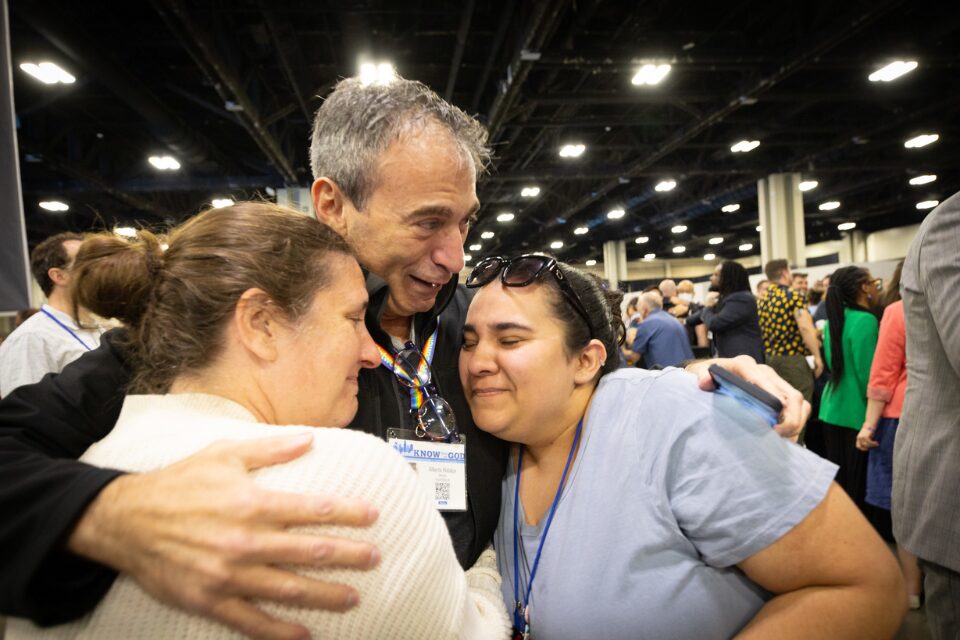
Rev. Joy Barrett, clergy delegate and senior pastor of Chelsea: First UMC, has appreciated the absence of rancor at the 2024 General Conference, compared to previous conferences, and how that spirit affirms this new journey The United Methodist Church is on with the possibilities given in the regionalization legislation that just passed.
She noted that it’s important to think about those places where John Wesley moved away to be very contextual, allowing lay preachers to preach and permitting worship outside of a church building. “Those freedoms to adapt were revolutionary in Wesley’s day,” noted Joy, “and that’s the whole effort of this General Conference with regionalization, so we can adapt for the circumstances we find ourselves.”
Joel Fitzgerald also said that what he’s seeing at General Conference shows him the new path The United Methodist Church is heading down is positive. “On this issue, we have come to a place where we’re saying, okay, even though we aren’t of one mind, we can still find a way to do church together. And that’s great.”
At the local church level, Ruth Sutton, lay reserve delegate from Sanford UMC, hopes her congregation will do the same thing and realize they can unite as a faith community and yet disagree. “There are probably some people in my own church who aren’t going to buy in, but I don’t think it will affect the church’s leadership team. Plus, there’s room for all of us in the church. We just don’t want there to be more harm done.”
The harmful language that has been part of church polity for decades has caused trauma for many LGBTQ persons, and a simple vote will not erase the losses and harm done to beloved children of God and those who love them.
The tears of joy shed today were also tears of lament. Ed Rowe explained that the church needs to acknowledge and address the damage it has done. “See, I don’t want us to forget the lament. These tears are all holy water. The pain did not just go away with this vote. The Trail of Tears was real, not just for First Nations people. It’s still real for LGBTQ people, and the church should never have been part of this travesty. It cost people careers, plus there are more suicides than we know.”
This is a matter close to his heart, as Ed’s daughter was told she’d never become a United Methodist pastor because of her sexual orientation. She chose a different ministry path instead. In 1972, The United Methodist Church’s Social Principles advocated for the first time a statement about homosexuality. “And at every General Conference since, we’ve made it worse,” said Ed. “My daughter was told that she would never become a United Methodist pastor, as were thousands of others because they were out or because they were also in a same-gender-loving relationship.”
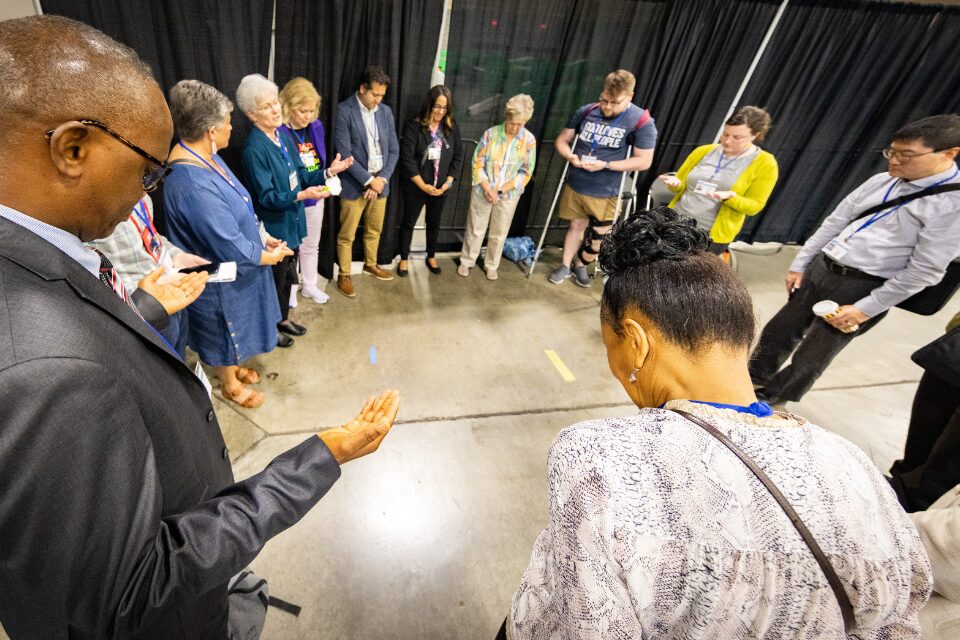
Joy Barrett admits that we’ve lost a lot because of this harmful language. “And by taking it to neutral as the actions of this General Conference have done so far, that stops.” She went on to speak about the painful story of a friend: “Years ago, my very dearest clergy colleague friend left our denomination because she couldn’t be who she is. And I lament that to this day, and it forever changed how I feel about my church. So, to be here now causes great rejoicing, but it doesn’t change what was lost — not only for me personally but our denomination.”
Joel Fitzgerald noted that the celebratory atmosphere in the plenary space is wonderful, but there’s also the need and responsibility to lament, ask forgiveness, and repent. “As we, as the church, are turning in a new direction,” he said, “that is an act of repentance. It doesn’t fix things. It doesn’t fix the wrongs that have happened. But it also is a chance for us to live more into God’s call for us.”
Overall, our Michigan Conference delegates express hope for a fully inclusive United Methodist Church. The Michigan Conference has been moving in this direction for some time. To understand the movement better, read testimonials from two recent ordinands: Rev. Jess Davenport and Rev. Jenaba Waggy.
“I think practically for Michigan United Methodists,” said Joel, “not a ton is going to change. We’ve been living into this. Honestly, it’s great that the language changed, but in some ways, we were doing some of the needed changes earlier. And in the same way, changing something in the rule book must be lived out. This is one step towards the beloved community, but it isn’t the final one.”
Joy says this is the season for the church to focus more on what we say yes to. “All this language of prohibition has gotten so much traction and airtime recently,” she said, “and so we’ve decided to set that language aside, which opens up this huge space to say, what do we say yes to, which can lead us in all kinds of marvelous directions.”
She also celebrates the fact that “same-gendered couples will be able, with a clear conscience, to invite me to preside for their marriage ceremony. And they won’t feel like they shouldn’t do that because it would put me in an awful situation. If there is a person of whatever age who feels a calling to ministry, regardless, we can affirm them if we discern their gifts to be there for ministry and know that we’re not violating the Book of Discipline. So, yes, today is a great victory, and let that be enough to hold us until we can form the United States Regional Conference and then take the next steps forward.”
This article included content from a UM News article by Heather Hahn, with contributions by Sam Hodges, Jessica Brodie, and Erik Alsgaard.
Last Updated on May 9, 2024

